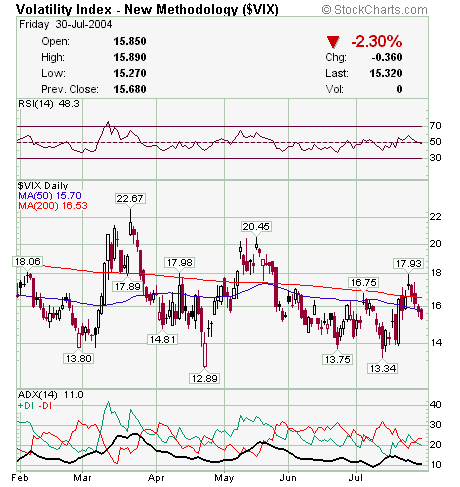S&P 500 1,100.92 +.04%
NASDAQ 1,892.74 +.62%
Leading Sectors
Broadcasting +2.21%
Semis +1.80%
Disk Drives +1.59%
Lagging Sectors
Airlines -.93%
Telecom -.99%
HMO's -1.85%
Other
Crude Oil 43.50 +1.71%
Natural Gas 6.15 .49%
Gold 393.30 +.90%
Base Metals 112.13 +1.15%
U.S. Dollar 89.92 -.02%
10-Yr. T-note Yield 4.48% -2.07%
VIX 15.49 -1.21%
Put/Call .60 -6.25%
NYSE Arms 1.51 +64.13%
Market Movers
APCC -13.1% after missing 2Q forecast and giving weaker outlook.
MGAM -25.0% after missing 3Q estimates and lowering 04 forecast.
KLAC +7.5% after meeting 4Q estimates, raising 1Q outlook and WR Hambrecht upgrade to Buy.
GILD +10.5% after beating 2Q estimates substantially.
VSEA +8.8%after meeting 3Q estimates, raising 4Q outlook and Bank of America upgrade to Neutral.
SWIR +8.1% as Piper Jaffray reiterated Outperform after meeting with management.
CYTC +8.5% after beating 2Q estimates and making positive comments.
IRF +7.3% after CEO made positive comments on CNBC.
ACAP +14.2% after substantially beating 2Q estimates and multiple upgrades.
VAS -17.3% on weaker-than-expected 2Q, multiple downgrades and executive resignations.
SYNA -13.6% after meeting 4Q estimates, but lowering 1Q forcast.
PHS -9.3% after beating 2Q estimates, but poor earnings quality.
TGI -9.2% after missing 2Q earnings estimates.
Economic Data
Advance 2Q Gross Domestic Product rose 3.0% versus expectations of a 3.7% rise and an upwardly revised 4.5% increase in 1Q.
Advance 2Q Personal Consumption rose 1.0% versus expectations of a 2.0% increase and an upwardly revised 4.1% increase in 1Q.
Advance 2Q GDP Price Deflator rose 3.2% versus estimates of a 3.0% rise and a downwardly revised 2.7% increase in 1Q.
Final Univ. of Mich. Consumer Confidence for July was 96.7 versus estimates of 96.2 and a reading of 96.0 prior.
Chicago Purchasing Manager report for July was 64.7 versus estimates of 60.0 and 56.4 in June.
Recommendations
Goldman Sachs reiterated Outperform on SYMC, DOW, BSX, CMX, AMIS, LIZ and MSFT. Goldman reiterated Underperform on KZL. Citi SmithBarney reiterated Buy on MWD, target $72. Citi reiterated Buy on BHI, target $50. Citi reiterated Buy on ACGL, target $48. Citi reiterated Buy on SPF, target $90. Citi reiterated Buy on BC, target $49. Citi reiterated Buy on BZH, target $174. Citi reiterated Sell on XOM, target $40.50. Citi reiterated Buy on BG, target $50. Citi reiterated Buy on UNH, target $86. DNR cut to Sector Underperform by CIBC. VAS cut to Sector Underperform by CIBC. KSS raised to Overweight at Prudential, target $53. JWN cut to Underweight at Prudential, target $45. GNTX raised to Overweight at Prudential, target $40. ITMN cut to Sell at Legg Mason. XMSR rated Buy at Bank of America, target $32. CVD raised to Outpeform at Bear Stearns, target $51. NILE raised to Buy at Merrill, target $36. HE cut to Sell at Merrill.
Mid-day News
U.S. stocks are mostly higher today on stronger earnings reports, falling interest rates and short covering. Spirit Air, the biggest privately owned U.S. airline, is lowering its prices in a bid to prevent JetBlue Air from grabbing customers when it starts flights from New York's LaGuardia airport to Florida in September, Bloomberg reported. The Sarbanes-Oxley Law, passed two years ago today, has made investors more confident about the accuracy of the financial information they receive from companies, Nasdaq Chief Executive Bob Greifeld wrote in the Wall Street Journal. The U.S. FBI warned police throughout the western U.S. that al-Qaeda terrorists may be planning to strike in California or New Mexico, the LA Times reported. Procter & Gamble may report its biggest quarterly earning gain in two years, on Monday, bolstered by acquisitions and surging sales in developing countries such as China, Bloomberg said. The U.S. economy grew at a 3% annual rate from April through June, less than forecast, Bloomberg reported. The Chicago Purchasing Manager report rebounded sharply in June to 64.7, near May's 16-year high reading of 68.0, Bloomberg reported. Bristol-Myers Squibb, the biggest maker of AIDS drugs, agreed to pay $300 million to settle a class-action lawsuit related to its wholesaler inventory practices, accounting and partnership with ImClone Systems, Bloomberg reported. Crude oil in New York rose to a record for the second time this week on concern that supply from the world's top exporters will be disrupted as fuel consumption surges, Bloomberg said.
BOTTOM LINE: The Portfolio is substantially higher today on strength in my internet, semi-equipment and alternative energy longs. I have not traded today and the Portfolio is still 125% net long. Anti-business political rhetoric and rising energy prices are restraining today's market. While GDP was weaker-than expected, I continue to believe that the slowdown is just a pause that refreshes and economic growth will accelerate in the near future. Signs of this are already appearing as evidenced by today's very strong Chicago Purchasing Manager's report. I expect U.S. stocks to remain mixed into the close as the spiking Arms Index and falling interest rates offset the negatives.
